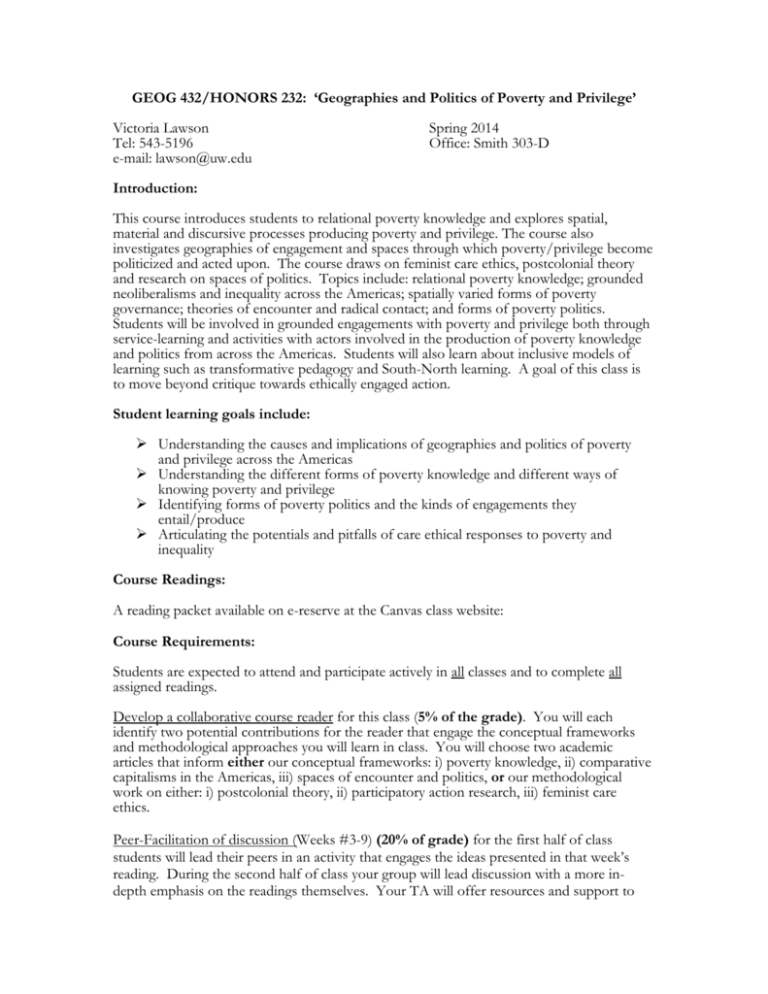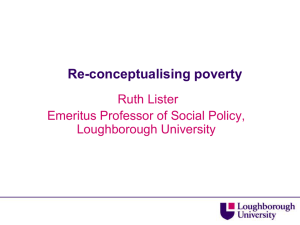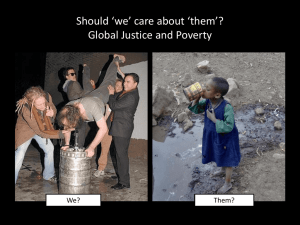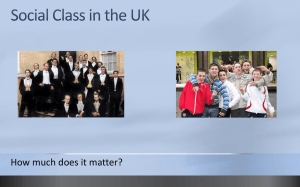Geography 432 Curated Syllabus
advertisement

GEOG 432/HONORS 232: ‘Geographies and Politics of Poverty and Privilege’ Victoria Lawson Tel: 543-5196 e-mail: lawson@uw.edu Spring 2014 Office: Smith 303-D Introduction: This course introduces students to relational poverty knowledge and explores spatial, material and discursive processes producing poverty and privilege. The course also investigates geographies of engagement and spaces through which poverty/privilege become politicized and acted upon. The course draws on feminist care ethics, postcolonial theory and research on spaces of politics. Topics include: relational poverty knowledge; grounded neoliberalisms and inequality across the Americas; spatially varied forms of poverty governance; theories of encounter and radical contact; and forms of poverty politics. Students will be involved in grounded engagements with poverty and privilege both through service-learning and activities with actors involved in the production of poverty knowledge and politics from across the Americas. Students will also learn about inclusive models of learning such as transformative pedagogy and South-North learning. A goal of this class is to move beyond critique towards ethically engaged action. Student learning goals include: Understanding the causes and implications of geographies and politics of poverty and privilege across the Americas Understanding the different forms of poverty knowledge and different ways of knowing poverty and privilege Identifying forms of poverty politics and the kinds of engagements they entail/produce Articulating the potentials and pitfalls of care ethical responses to poverty and inequality Course Readings: A reading packet available on e-reserve at the Canvas class website: Course Requirements: Students are expected to attend and participate actively in all classes and to complete all assigned readings. Develop a collaborative course reader for this class (5% of the grade). You will each identify two potential contributions for the reader that engage the conceptual frameworks and methodological approaches you will learn in class. You will choose two academic articles that inform either our conceptual frameworks: i) poverty knowledge, ii) comparative capitalisms in the Americas, iii) spaces of encounter and politics, or our methodological work on either: i) postcolonial theory, ii) participatory action research, iii) feminist care ethics. Peer-Facilitation of discussion (Weeks #3-9) (20% of grade) for the first half of class students will lead their peers in an activity that engages the ideas presented in that week’s reading. During the second half of class your group will lead discussion with a more indepth emphasis on the readings themselves. Your TA will offer resources and support to student facilitators. Each student will facilitate our discussions as part of a group once during the quarter. On the week you are facilitating discussion, you have two responsibilities: 1) Read the online posts to get a sense of key issues people are considering, and 2) prepare an activity and guiding questions that will inspire and structure our class discussion. Reading Responses (Weeks #2-9) (15% of grade): on the weeks you are not leading class discussion, you are responsible for writing and posting your reflection on the class discussion board. Each reflection should connect themes in the readings, class discussions and your service learning (or research) experiences. Well-written reflections will offer a critical response to at least one of the readings, will explore concepts through your independent observations, and raise questions to be explored in class discussion. As part of your weekly assignment, we encourage you to read a selection of the posted reflections so that you are prepared to discuss the themes and questions raised by your fellow students. Reflections should be up to 1 page double spaced, and will receive credit based on completion and effort. Take-home midterm exam worth 25% of grade between weeks 6 and 7 of the quarter. Learning reflection statement worth 5% of grade. You will submit a 1-2 page reflective essay on your learning in the class. We will distribute a specific prompt for this later in the quarter. This essay is required and you will receive ungraded credit for submitting it. To illustrate your reflective essay, you are also asked to submit two assignments, one from this class and one from a lower-division Geog course that you have taken in the past or are currently taking. If you haven’t taken a previous geography class, please submit a paper or project summary form any freshman or sophomore class you have taken. You can submit these as an e-portfolio or in hard copy. Students will conduct a service-learning project (with an ‘opt-out alternative research project’). This will involve both a group presentation in week #10 (10%) and a written paper for (20%) of your grade. I will provide separate handouts with details on each option. Important Dates: Monday May 26th, Memorial Day Friday June 6th last day of class ** final paper due Monday June 9th at 10:00am in TA box ** Documenting and Citing Sources: Citing is the act of indicating the source of information. Authors cite their sources: 1. to give credit to the originator of an idea or research they wish to discuss and 2. to allow readers to locate the source of the information and read it in context. Citation styles are a standardized system for citing materials used when writing research papers. Citation styles are created by professional organizations such the Modern Language Association (MLA) or publishers such as the University of Chicago Press (Chicago Style). When engaging in research for this course, you are expected to: 1. Assemble and analyze a set of sources that you have determined are relevant to the issues you are investigating 2. Acknowledge clearly when and how you are drawing on the ideas or phrasings of others 3. Cite and acknowledge sources, using a consistent citation style. The Libraries citation and writing help guide, http://guides.lib.washington.edu/citations, lists citation style examples and provides links to citation management software. Appropriate Use of Internet Sources: Non-academic internet sources include sites like Wikipedia, non-profit organizational websites and for-profit commercial websites; they do not include e-journal articles, online scholarly journal articles and academic e-books. When incorporating non-academic websites into your research, the burden is on you to establish the validity, authorship, timeliness, and integrity of what you find. Websites and web documents can easily be copied and falsified or copied with omissions and errors -- intentional or accidental. However, many reputable agencies, government organizations and publishers make quality sources available by publishing them on the web. Your assignment requirements and your own critical reading of web sources should guide your use of internet sources. Consult "Evaluating web pages: techniques to apply & questions to ask" for more guidance, http://www.lib.berkeley.edu/TeachingLib/Guides/Internet/Evaluate.html COURSE READING LIST Week 1 Rethinking Poverty and Privilege Activities: Service-Learning setup; student curated reader developed; students groups formed (for peer reading and presentations); ‘Where I’m From Poem’ activity Videos: Ananya TED talk, “Can we shop to end Poverty?” or “Who Profits from Poverty?” and counter-narrative at http://www.youtube.com/watch?v=KUVpgpE3uw&feature=youtu.be. Readings: Keating, A. 2007. Teaching Transformation. Palgrave, MacMillan: NY. Lawson, V. with Middle Class Poverty Politics Group. 2012. Decentering Poverty Studies: Middle Class Alliances and Poverty Politics. Singapore Journal of Tropical Geography. Smith, A. 2013. 'Unsettling the Privilege of Self-reflexivity' in Winddance Twine, F. and B. Gardener, 2012. Geographies of Privilege. Week 2 Activities: Curation of Course Reader Lawson at AAG week 2, students build reader; Conduct library research, select readings and write essay explaining selections Attend library workshop by Amanda Hornby 11:30 – 12:20 in Suzallo Instruction Lab 102 A Week 3 Comparative Capitalisms and Poverty in the Americas Activities: giving to panhandlers KUOW: www.kuow.org/post/giving-panhandlers or Cory Booker on Daily Show extended interview Readings (selected from, plus student selections): Harvey, D. 1985. The Geopolitics of Capitalism. In D. Gregory and J. Urry (eds) Social Relations and Spatial Structures. Hall, S., Massey, D. and Rustin, M. 2013. After neoliberalism: analyzing the present. Soundings. Escobar, A. 2010. Latin America at a Crossroads. Cultural Studies 24(1), 1-65. Elwood, S., Lawson, V., Canevaro, S., and Viotti, N. 2014. ‘Poverty Politics Post Crisis in Argentina and the US: class subjects and relational practices in urban neighborhoods’. Working Paper, RPN Project. Week 4 Decentering Dominant Knowledge about Poverty and Privilege Activities: student-led discussions. Video: Invisible People: http://invisiblepeople.tv/blog/ Readings (plus student selections): Rivenburgh, N. K., & Manusov V. (2010). Decentering as a research design strategy for international and intercultural research. Journal of International Communication, 16(1), 23-40. Lawson, V. (2012). Decentering poverty studies: Middle class alliances and the social construction of poverty. Singapore Journal of Tropical of Tropical Geography, 33, 1-19. Kendall, Frances E. “Chapter 4: Understanding White Privilege.” In Understanding White Privilege: Creating Pathways to Authentic Relationships Across Race. New York: Routledge, 2006: 6178. Supplemental Readings: O’Connor, A. 2002. Poverty Knowledge. Social Science, Social Policy and the Poor in Twentieth Century. Yosso, T. 2005. Whose Culture has Capital? A Critical Race Theory Discussion of Community Cultural Wealth. Race, Ethnicity and Education Vol 8(1), 69-91. Week 5 Researching, Learning and Building knowledge about Poverty and Privilege Activities: student –led discussions. Have students fill out social services paperwork, look at websites and brochures for those social services. Video: Readings: Sparks, Tony. 2010. “Broke Not Broken: Rights, Privacy, and Homelessness in Seattle.” Urban Geography 31 (6): 842–62. Stephens, C. 2010. “Privilege and Status in an Unequal Society: Shifting the Focus of Health Promotion Research to Include the Maintenance of Advantage.” Journal of Health Psychology 15 (7): 993–1000. Cahil, C. 2007. ‘The Personal is Political: developing new subjectivities through PAR’ Gender Place and Culture 14(3), 267-292. Supplemental Readings Richards, Stephen C., Donald Faggian, Jed Roffers, Richard Hendricksen, and Jerrick Krueger. 2008. “Convict Criminology: Voices from Prison.” Race/Ethnicity: Multidisciplinary Global Contexts 2 (1): 121–36. Sangtin Writers Collective and Nagar, R. 2006. Playing with Fire. University of Minnesota Press. Week 6 Researching, Learning and Building knowledge about Poverty and Privilege Activities: Listening Circle with Jess and perhaps Elyse, Amy, Meredith to talk about the grounded action; visit from Homeless Speakers Bureau, Real Change; Video of Yvette Lewis on The Colbert Report: http://www.thedailybeast.com/videos/2011/01/31/christine-yvette-lewis-ofdomestic-workers-united-on-colbert.html Readings: Butler, J. 2003. Global Violence, Sexual Politics chapter in Queer Ideas, David R. Kessler Lectures in Lesbian and Gay Studies. CUNY Press. Cahill, C., Cerecer, D., and Bradley, M. 2010. Dreaming of… Affilia Journal of Women and Social Work 25(4), 406-416. Dyck, I. 2005. Feminist Geography, the ‘everyday’ and local-global Relations. The Canadian Geographer 49(3), 233-243. Supplemental Reading Lawson, V. 2007. Geographies of Care and Responsibility Annals of the Association of American Geographers. Pearson, R. and Kusukabe, K. 2012. Who Cares? Gender, Reproduction and Care Chains of Burmese Migrant Workers in Thailand. Feminist Economics 18(2), 149-175. Week 7 Research on Relational Poverty Activities: conduct an observation walk in Pioneer Square or Belltown. Brent Adams and Jeremy Leonard’s mini documentary explores sanctioned tent cities throughout the Pacific Northwest: http://www.opportunityvillageeugene.org or Video: Tent City 3 Readings: Mitchell, D. 2009. Homelessness, American Style. Urban Geography 32(7), 933-956. Roy, A. 2003. Paradigms of Propertied Citizenship: Transnational Techniques of Analysis. Urban Affairs Review 38(4), 463-491. Murphy, S. 2009. Compassionate Strategies of Managing Homelessness in Antipode, 41(2), 305-325. Supplemental Readings: Sparks. T. Governing the Homeless in an Age of Compassion. http://depts.washington.edu/relpov/governing-the-homeless-in-an-age-of-compassion/ Miewald, C. and McCann, E. 2014. The Hastings Shuffle. Antipode. Week 8 Geographies of Encounter and Alliance Activities: Sarah and I to talk about our encounter paper? Video: http://www.youtube.com/watch?v=jH0a8dcxUBs Readings: Askins, K. and Pain, R. 2011. Contact Zones, Encounter, Participation and the Messiness of Interaction. Society and Space 29, 803-821. Leitner, H. 2011. Spaces of Encounters: Immigration, race, class and the politics of belonging in Small-Town America. Annals of the Association of American Geographers 102 (4), 828-846. Wilson, H. 2011. Passing Propinquities in the Multicultural City: the everyday encounters of bus passengering. Environment and Planning A, 43, 634-649. Lawson, V. and Elwood, S. 2014. Encountering Poverty: Space, class and Poverty Politics. Antipode. Supplemental Readings: Valentine, G. Living with difference: Reflections on geographies of encounter. Progress in Human Geography 32(3):323–337 Fraser, J. 2004. Beyond Gentrification, Mobilizing Communities and Claiming Space. Urban Geography 25(5), 437-457. Week 9 Effecting Change Activities: student-led discussions. Video: Cory Book on The Daily Show: http://www.thedailyshow.com/watch/wed-december-12-2012/exclusive---corybooker-extended-interview-pt--1T TED talk on the power of what one person can do to transform a neighborhood and a culture. "Gardening is the most therapeutic and DEFIANT act you can do - especially in the inner city. Plus you get strawberries": http://www.npr.org/2013/05/17/181691507/how-can-you-give-a-community-better-health Readings: Ramirez, M. 2014. Paper in submission Mitchell, D. 2008. Confessions of a Desk Bound Radical. Antipode 40(3), 448-454. DiAngelo, Putting it All Together. Supplemental Reading: Mitchell, K. 2008. Practicing Public Scholarship. Wiley-Blackwell: Oxford. Week 10 Student Presentations A handout will describe your responsibilities as presenters and reviewers.








